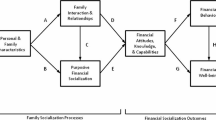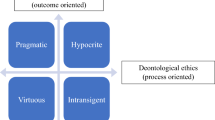Abstract
We used a decision-making conceptual framework from family resource management combined with procedural justice frameworks from social psychology to (i) articulate the elements and rules of procedural fairness, (ii) develop a theoretical organization and code to include procedural fairness principles as applied to legal decision processes in divorce, and (iii) describe the perceptions of divorcing parties about the violations of procedural fairness principles in their own divorce process. Procedural fairness principles included accuracy, consistency, ethicality, bias suppression, correctability, and representativeness. Results of qualitative data analyses were consistent with experimental studies in that divorced people were concerned with fair procedures and particularly with violations of the principles of ethicality, consistency, accuracy, and representativeness.
Similar content being viewed by others
References
Austin, W., and Tobiason, J. M. (1984). Legal justice and the psychology of conflict resolution. In Folger, R. (ed.),The Sense of Injustice: Social Psychological Perspectives, Plenum Press, New York, pp. 227–274.
Barrett-Howard, E., and Tyler, R. R. (1986). Procedural justice as a criterion in allocative decisions.J. Pers. Soc. Psychol. 50: 296–304.
Bay, R. C., and Braver, S. L. (1990). Perceived control of the divorce settlement process and interparental conflict.Fam. Rel. 39: 382–387.
Bies, R. J., and Moag, J. S. (1986). Interfactional justice: Communication criteria of fairness. In Lewicki, R. J., Sheppard, B. H., and Bazerman, M. H. (eds.),Research in Negotiation in Organizations, JAI, Greenwich, CT, pp. 43–55.
Bies, R. J., and Shapiro, D. L. (1987). Interactional fairness judgments: The influence of causal accounts.Soc. Justice Res. 1: 199–218.
Boss, P. (1988).Family Stress Management, Sage, Newbury Park, CA.
Burgess, S., Jackson, G., and Stafford, K. (1990). Influence of procedural decisions on divorce outcomes.Home Econ. Res. J. 18: 211–222.
Deacon, R. E., and Firebauch, F. M. (1988).Family Resource Management: Principles and Applications, Allyn & Bacon, Boston.
Deutsch, M. (1985).Distributive Justice, Yale University Press, New Haven, CT.
Diesing, P. (1976).Reason in Society: Five Types of Decisions and Their Social Conditions, Greenwood, Westport, CT.
Dollahite, D. C. (1991). Family resource management and family stress theories: Toward a conceptual integration.Lifestyles: Fam. Econ. Issues 12: 361–377.
Fishkin, J. S. (1983).Justice, Equal Opportunity, and the Family, Yale University Press, New Haven, CT.
Folger, R., and Greenberg, G. (1985). Procedural justice: An interpretive analysis of personnel systems. In Rowland, K. M., and Ferris, G. R. (eds.),Research in Personnel and Human Resources Management: A Research Annual, Vol. 3, JAI, Greenwich, CT, pp. 141–183.
Folger, R., and Konovsky, M. A. (1989). Effects of procedural and distributive justice on reactions to pay raise decisions.Acad. Manage. J. 32: 115–130.
Folger, R., and Martin, C. (1986). Relative deprivation and referent cognitions: Distributive and procedural justice effects.J. Exp. Soc. Psychol. 22: 531–546.
Graziano, W. G. (1987). Lost in thought at the choice point: Cognition, context, and equity. In Masters, J. C., and Smith, W. P. (1987).Social Comparison, Social Justice, and Relative Deprivation, Erlbam, Hillsdale, NJ, pp. 265–294.
Greenberg, J. (1984). On the apocryphal nature of inequity distress. In Folger, R. (ed.),The Sense of Injustice: Social Psychological Perspectives, Plenum Press, New York, pp. 167–188.
Greenberg, J. (1987). A taxonomy of organizational justice theories.Acad. Manage. Rev. 12(12): 9–22.
Greenberg, J. (1990). Organizational justice: Yesterday, today, and tomorrow.J. Manage. 16: 399–432.
Gross, I. H., Crandall, E. W., and Knoll, M. M. (1980).Management for Modern Families, Prentice-Hall, Englewood Cliffs, NJ.
Heuer, L., and Penrod, S. (1986). Procedural preference as a function of conflict intensity.J. Pers. Soc. Psychol. 51: 700–710.
Hoffman, S. D., and Duncan, G. J. (1988). What are the economic consequences of divorce?Demography 25: 641–645.
Kitson, G. C., and Morgan, L. A. (1990). The multiple consequences of divorce: A decade review.J. Marr. Fam. 52: 913–924.
Krein, S. F., and Beller, A. H. (1988). Educational attainment of children from single-parent families: Differences by exposure, gender, and race.Demography 25: 221–234.
Lane, R. E. (1986). Market justice, political justice.Am. Polit. Sci. Rev. 80: 383–402.
Lerner, M. J., and Whitehead, L. A. (1980). Procedural justice viewed in the context of justice motive theory. In Mikula, G. (ed.),Justice and Social Interaction: Experimental and Theoretical Contributions from Psychological Research, Springer-Verlag, New York, pp. 219–256.
Leventhal, G. S. (1976). Fairness in social relationships. In Thibaut, J. W., Spence, J. T., and Carson, R. C. (eds.),Contemporary Topics in Social Psychology, General Learning Press, Morristown, NJ, pp. 211–239.
Leventhal, G. S. (1980). What should be done with equity theory? In Gergen, K. J., Greenberg, M. S., and Willis, R. H. (eds.),Social Exchange: Advances in Theory and Research, Plenum Press, New York, pp. 27–55.
Levanthal, G. S., Karuza, J., and Fry, W. R. (1980). Beyond fairness: A theory of allocation preferences. I Mikula, G. (ed.),Justice and Social Interaction, Springer Verlag, New York, pp. 167–218.
Lind, E. A., and Tyler, T. R. (1988).The Social Psychology of Procedural Justice, Plenum Press, New York.
Lissak, R. I., and Sheppard, B. H. (1983). Beyond fairness: The criterion problem in research on dispute intervention.J. Appl. Soc. Psychol. 13: 45–65.
Markovsky, B. (1985). Toward a multi-level distributive justice theory.Am. Sociol. Rev. 50: 822–839.
Mikula, G. (1986). The experience of injustice: Toward a better understanding of its phenomenology. In Bierhoff, H. W., Cohen, R. L., and Greenberg, J. (eds.),Justice in Social Relations, Plenum Press, New York, pp. 103–123.
Okin, S. M. (1989).Justice, Gender, and the Family, Basic Books, New York.
Paolucci, B., Hall, O., and Axinn, N. (1977).Family Decision-Making: An ecosystem approach, Wiley, New York.
Price, S. J., and McKendry, P. C. (1989). Current trends and issues in divorce: An agenda for family scientists in the 1990's.Fam. Sci. Rev. 2: 219–236.
Reis, H. T. (1984). The multidimensionality of justice. In Folger, R. (ed.),The Sense of Injustice: Social-Psychological Perspectives, Plenum Press, New York, pp. 25–61.
Rettig, K. D. (1988). A framework for integrating family relations and family resource management. Paper presented at the Theory Construction and Research Methodology Workshop, National Council on Family Relations, Philadelphia, PA. (Minnesota Agricultural Experiment Station Paper #16,548.)
Rettig, K. D. (in press). Problem-solving and decision-making processes of family life: An ecological framework for family relations and family resource management.Marr. Fam. Rev.
Rettig, K. D., and Dahl, C. M. (1991). The unlikely possibility of justice in divorce settlements. Proceedings, Theory Construction and Research Methodology Workshop, National Council on Family Relations, Denver, CO.
Rice, A. S., and Tucker, S. M. (1986).Family Life Management, 6th ed., Macmillan, New York.
Schaeffer, N. C. (1990). Principles of justice in judgments about child support.Soc. Forces 69: 157–179.
Sheppard, B. H. (1985). Justice is no simple matter: Case for elaborating our model of procedural fairness.J. Pers. Soc. Psychol. 49: 953–962.
Sheppard, B. H., and Lewicki, R. J. (1987). Toward general principles of managerial fairness.Soc. Justice Rev. 1: 161–176.
South, S., and Spitze, G. (1986). Determinants of divorce over the martial life course.Am. Sociol. Rev. 51: 583–590.
Steil, J. M. (1989). Justice and deserving in the family: Introduction.Soc. Justice Res. 3: 75–76.
Steil, J. M., and Makowski, D. G. (1989). Equity, equality, and need: A study of the patterns and outcomes associated with their use in intimate relationships.Soc. Justice Res. 3: 121–137.
Stirling, K. J. (1989). Women who remain divorced: The long-term economic consequences.Soc. Sci. Quart. 80: 549–61.
Syroit, J. E. M. M. (1991). Interpersonal and intergroup injustice: Some theoretical considerations. In Steensma, H., and Vermunt, R. (eds.),Social Justice in Human Relations: Societal and Psychological Consequences of Justice and Injustice, Vol. 1, Plenum Press, New York, pp. 259–277.
Thibaut, J., and Walker, L. (1978). A theory of procedure.California Law Rev. 66: 541–566.
Thibaut, J., and Walker, L. (1975).Procedural Justice: A Psychological Analysis, Erlbaum, Hillsdale, NJ.
Thompson, L. (1991). Family work: Women's sense of fairness.J. Fam. Issues 12: 181–196.
Tyler, T. R. (1987). Procedural justice research.Soc. Justice Res. 1: 41–66.
Tyler, T. R. (1989). The psychology of procedural justice: A test of the group-value model.J. Pers. Soc. Psychol. 57: 830–838.
Tyler, T. R., and Folger, R. (1980). Distributional and procedural aspects of satisfaction with citizen-police encounters.Basic Appl. Soc. Psychol. 1: 281–292.
Tyler, T. R., and Lind, A. (1991). Procedural processes and legal institutions. In Steensma, H., and Vermunt, R. (eds.),Social Justice in Human Relations: Societal and Psychological Consequences, Vol. 2, Plenum Press, New York, pp. 71–97.
Wallerstein, J. S., and Blakeslee, S. (1990).Second Chances: Men, Women, and Children a Decade After Divorce, Ticknor and Fields, New York.
Weitzman, L. (1985).The Divorce Revolution: The Unexpected Social and Economic Consequences for Women and Children in America, Free Press, New York.
White, L. K. (1990). Determinants of divorce: A review of research in the eighties.J. Marr. Fam. 52: 904–912.
Author information
Authors and Affiliations
Rights and permissions
About this article
Cite this article
Rettig, K.D., Dahl, C.M. Impact of procedural factors on perceived justice in divorce settlements. Soc Just Res 6, 301–324 (1993). https://doi.org/10.1007/BF01054464
Issue Date:
DOI: https://doi.org/10.1007/BF01054464




